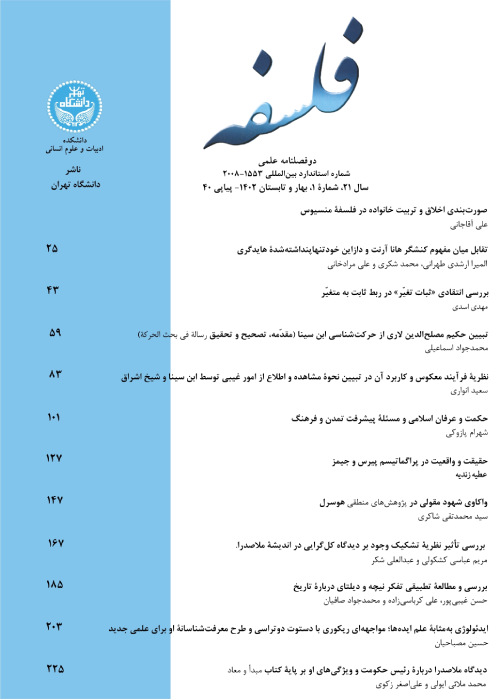The Contrast Between the Concept of Hannah Arendt's Actor and Heideggerian Solipsistic Dasein
Author(s):
Article Type:
Research/Original Article (دارای رتبه معتبر)
Abstract:
The twentieth-century prominent political thinker, Hannah Arendt, has gone through a very different course from his master, Martin Heidegger, in presenting her viewpoints on the correlation between political action (praxis) and overcoming totalitarianism. Applying a phenomenological analysis of history, she surveys the human condition from the pre-Socratic era to now in order to illuminate this correlation. As a political existentialist, Arendt presumes that the privation of true political philosophy throughout the history of Western metaphysical tradition is the consequence of trivializing the necessity of action in general and praxis in particular compared to the centrality of speculation in post-Socratic tradition, especially Platonic school. According to Arendt, pre-Socratic Polis is the ideal political community, where the uniqueness of individuals -represented through their speech and action- is celebrated while being with "the others"; however, speculation in seclusion has become far more authentic than action in public after Socrates' trial. No need to mention Heidegger’s influential impact on Arendt's critical approach to Western metaphysical tradition; however, she emphasizes the disclosure of the actors’ “who” through action and speech in the public sphere, contrary to Heidegger’s disclosure of Dasein as “Aletheia” or the revelation of the truth. To phrase it, Arendt is switching over “being” to “appearance” which is manifested in action and speech in her thought. Her emphasis on man’s presence and his interaction with the others in the plurality of the public sphere to liberate from the crisis of twentieth-century totalitarianism and alienation stands in contrast to the extravagant egoism and solipsism of Heideggerian Dasein that have been recognized and criticized by Arendt herself. The one which is albeit known as being-in-the-world according to Arendt, but it is considered as inauthentic if being presented in the plurality of Mitsein (being-with), having an “Idle Talk” with them and consequently falling into everydayness. Therefore, Dasein prefers to remain an “ideal self” in isolation and seclusion according to Arendt.Arendt maintains that Heidegger's observation of Dasein as an "ideal self" is no way dissimilar to the post-Socratic man of speculation, who is engaged in noetic thinking in his privacy, the attitude that has diminished action in favor of reflection all through the Western metaphysical tradition. Mentioning the crisis of the twentieth-century totalitarianism in Nazi Germany, Stalinist Soviet Union and the Eastern Bloc, Arendt critically assumes that ontological egoism and solipsism have eliminated politics and successively prepared the ground for the rise of the mentioned crisis, whereas totalitarianism seeks atomized and disjointed societies. Applying a descriptive- analytic methodology, the present research attempts to compare Arendt's and Heidegger's standpoints towards the above concern and elucidates Arendt's criticism of Heidegger in clearing the crisis of totalitarianism. It also adverts Arendt's solution to exhaust the mentioned crisis, "love of the world", which creates the necessary impulsion and stimulus to overcome solipsism and triggers acting in public sphere, according to Arendt.
Keywords:
Language:
Persian
Published:
Philosophy, Volume:51 Issue: 1, 2023
Pages:
25 to 42
magiran.com/p2701769
دانلود و مطالعه متن این مقاله با یکی از روشهای زیر امکان پذیر است:
اشتراک شخصی
با عضویت و پرداخت آنلاین حق اشتراک یکساله به مبلغ 1,390,000ريال میتوانید 70 عنوان مطلب دانلود کنید!
اشتراک سازمانی
به کتابخانه دانشگاه یا محل کار خود پیشنهاد کنید تا اشتراک سازمانی این پایگاه را برای دسترسی نامحدود همه کاربران به متن مطالب تهیه نمایند!
توجه!
- حق عضویت دریافتی صرف حمایت از نشریات عضو و نگهداری، تکمیل و توسعه مگیران میشود.
- پرداخت حق اشتراک و دانلود مقالات اجازه بازنشر آن در سایر رسانههای چاپی و دیجیتال را به کاربر نمیدهد.
In order to view content subscription is required
Personal subscription
Subscribe magiran.com for 70 € euros via PayPal and download 70 articles during a year.
Organization subscription
Please contact us to subscribe your university or library for unlimited access!


